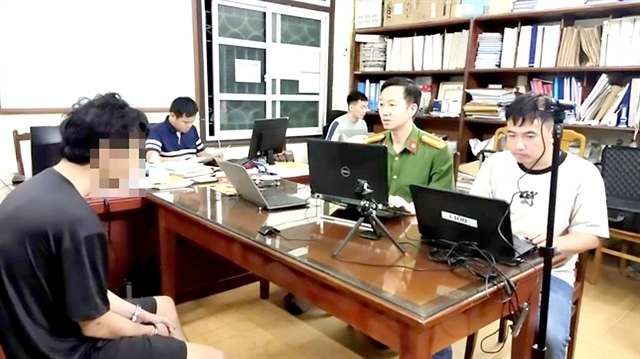After string of violent crimes, province strives to manage mentally ill residents
Society – Economy - Ngày đăng : 08:54, 18/12/2024
 |
| A mentally ill man suspected of murdering his father and fleeing is arrested by the police. — Photo courtesy of Phú Thọ Province |
PHÚ THỌ — Phú Thọ Province has recently seen a series of serious crimes involving mentally ill people, showing the difficulty of managing and providing mental health care for people with mental illness.
In October this year alone, the northern province witnessed three serious crimes involving mentally ill people, including two murders.
On October 3, Xuân Áng Commune Police and Hạ Hoà District Police successfully rescued a five-year-old child who was beaten and held at knifepoint by a person with mental illness.
Then on October 12, 67-year-old Đào Văn Hùng, a resident of Thông Đậu Zone, Minh Nông Ward in Việt Trì City, was murdered -- allegedly by his son Đào Việt Đức, 32, who is a mentally ill man.
After the alleged crime, Đức fled and was arrested by authorities while hiding in a shack in Đức Bác Commune, Sông Lô District at 7pm that same day.
On October 28, a serious murder case occurred in Chiềng Zone, Kim Thượng Commune, Tân Sơn District, causing two deaths. The suspected perpetrator is a patient with mental illness receiving treatment at home.
These serious crimes involving people with mental illness are sounding the alarm about managing the mental health of patients in the community.
Obstacles
The Phú Thọ Department of Health said that the province faces a number of difficulties in providing mental health services.
Many patients are poor and live in mountainous areas with transportation difficulties, and have to undergo long-term treatment, often leading to bankruptcy.
When their condition becomes serious or they relapse, families often cannot get prompt treatment or do not notify medical facilities at all.
Many patients with serious mental illness are abandoned by their families, leading to patients wandering, causing insecurity and disorder and threatening the lives of relatives, families and the community where they live.
The province’s mental health care system is not uniform at all levels. Mental health services are mainly provided at specialised facilities at provincial and central levels, while inpatient psychiatric examination and treatment services are not provided at the district level.
Commune and ward levels currently only manage the list of mentally ill patients and dispense medication as prescribed by higher levels.
Medical staff, especially psychiatrists and clinical psychologists, are in great shortage in the province.
Most patients with mental illness and mental disorders are cared for, given medicine and treated in the community by their families, along with local authorities and the commune, ward and town health stations.
Only a small number are supported or can pay for living expenses, travel expenses and compulsory treatment at the provincial mental hospital.
In addition, very few patients are cared for at the provincial Social Assistance and Rehabilitation Centre for People with Mental Illness.
According to Nguyễn Huy Ngọc, Deputy Chairman of the provincial People's Committee and also Director of the Phú Thọ Department of Health, the province has 3,556 people with mental problems under management. This includes 1,726 people with schizophrenia, 1,355 with epilepsy, 339 with depression and 136 with other mental disorders.
Future plans
The province will direct the health sector to promote communication activities and training on mental health in the community, increase screening activities to detect problems early, and promptly bring newly diagnosed or suspected mentally ill people to medical facilities for examination, diagnosis and treatment.
The health sector will closely coordinate with organisations and unions in monitoring treatment and rehabilitation and reintegrating the patients into the community.
It will provide medicine to patients and instruct their families on helping them find jobs and participate in other activities while also closely monitoring them to ensure safety.
The sector will also continue to build and strengthen the mental health care network from the provincial to the local level, promote training and attract psychiatric specialists to work at medical facilities, as well as encourage the role of the private sector in mental health care.
Provincial police have said that to effectively prevent incidents and crimes caused by people with mental illness, close cooperation of families, local authorities and the community as a whole is needed. If unusual signs occur, it is necessary to take the patient to a medical facility and notify the authorities for support in resolving the problem. — VNS
